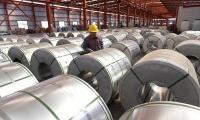Indian Aluminum Industry Needs Rs 2.2 Lakh Crore for Net-Zero
A new study finds that India's aluminum industry requires an additional Rs 2.2 lakh crore (USD 29 billion) to reach net-zero carbon emissions by 2070. The study by CEEW highlights the need for renewable energy, improved energy efficiency, and government support for decarbonization.
New Delhi, Apr 30 (PTI) The Indian aluminium industry would require an additional capital expenditure of nearly Rs 2.2 lakh crore (USD 29 billion) to achieve net-zero carbon emission, according to a new study.
The study by independent think-tank Council on Energy, Environment, and Water (CEEW) said renewable energy power sources could abate 49 per cent of the total emissions from the industry.
However, fully switching to renewable energy is not feasible right now because it is not always available. So a backup plan is needed, it added.
India has committed to achieving net-zero emissions (a balance between greenhouse gases emitted and removed from the atmosphere) by 2070 and 50 per cent cumulative electric power installed capacity from non-fossil fuel-based energy resources by 2030.
Aluminum is widely used, especially in the power sector, and it is one of India's fastest-growing industries. But achieving net-zero emissions could make it 61 per cent more expensive, with a yearly operational cost of about Rs 26,049 crore (USD 3.5 billion).
Even though India does not use a lot of aluminum per person (2.5 kilogrammes) compared to the global average (11 kilogrammes), the industry emitted a whopping 77 million tonnes of CO2 in 2019-20. Most of this comes from electricity used by the plants.
The study suggests that improving energy efficiency in aluminum production and using waste heat recovery can help cut emissions without making aluminum more expensive. However, most other ways to cut emissions, like using more renewable energy or capturing carbon, will make aluminum production more costly.
CEEW also launched a study on what it would take for the fertiliser industry to achieve net-zero emissions.
India is the second-largest fertiliser producer in the world, accounting for around 20 per cent of global production. However, it is a significant source of greenhouse gas emissions (around 25 MtCO2 annually) due to energy-intensive production processes and extensive fossil fuel use, particularly natural gas.
Because fertiliser production does not require much electricity, the CEEW study found that switching to renewable energy power would result in a mere 2 per cent reduction in emissions from the industry.
Ammonia (urea) production accounts for ~95 per cent of the emissions in this sector and, therefore, switching from grey to green ammonia can result in a 151 per cent emissions reduction. This would result in net negative emissions for the sector.
Carbon management options such as carbon capture and sequestration (CCS), carbon capture and utilisation (CCU), and afforestation may also be adopted by the industry.
Hemant Mallya, a fellow at CEEW, said the studies give a clear emerging message about the requirement of large amounts of capital and scale-up from various solution providers, including the renewable power, alternative fuels, and carbon storage and utilisation sectors.
"Aluminum and fertiliser are key industries for India's economic growth, and significant government support will be necessary to build the necessary infrastructure, such as power grid and pipelines, to decarbonise them and meet India's climate goals," he said.
The study by independent think-tank Council on Energy, Environment, and Water (CEEW) said renewable energy power sources could abate 49 per cent of the total emissions from the industry.
However, fully switching to renewable energy is not feasible right now because it is not always available. So a backup plan is needed, it added.
India has committed to achieving net-zero emissions (a balance between greenhouse gases emitted and removed from the atmosphere) by 2070 and 50 per cent cumulative electric power installed capacity from non-fossil fuel-based energy resources by 2030.
Aluminum is widely used, especially in the power sector, and it is one of India's fastest-growing industries. But achieving net-zero emissions could make it 61 per cent more expensive, with a yearly operational cost of about Rs 26,049 crore (USD 3.5 billion).
Even though India does not use a lot of aluminum per person (2.5 kilogrammes) compared to the global average (11 kilogrammes), the industry emitted a whopping 77 million tonnes of CO2 in 2019-20. Most of this comes from electricity used by the plants.
The study suggests that improving energy efficiency in aluminum production and using waste heat recovery can help cut emissions without making aluminum more expensive. However, most other ways to cut emissions, like using more renewable energy or capturing carbon, will make aluminum production more costly.
CEEW also launched a study on what it would take for the fertiliser industry to achieve net-zero emissions.
India is the second-largest fertiliser producer in the world, accounting for around 20 per cent of global production. However, it is a significant source of greenhouse gas emissions (around 25 MtCO2 annually) due to energy-intensive production processes and extensive fossil fuel use, particularly natural gas.
Because fertiliser production does not require much electricity, the CEEW study found that switching to renewable energy power would result in a mere 2 per cent reduction in emissions from the industry.
Ammonia (urea) production accounts for ~95 per cent of the emissions in this sector and, therefore, switching from grey to green ammonia can result in a 151 per cent emissions reduction. This would result in net negative emissions for the sector.
Carbon management options such as carbon capture and sequestration (CCS), carbon capture and utilisation (CCU), and afforestation may also be adopted by the industry.
Hemant Mallya, a fellow at CEEW, said the studies give a clear emerging message about the requirement of large amounts of capital and scale-up from various solution providers, including the renewable power, alternative fuels, and carbon storage and utilisation sectors.
"Aluminum and fertiliser are key industries for India's economic growth, and significant government support will be necessary to build the necessary infrastructure, such as power grid and pipelines, to decarbonise them and meet India's climate goals," he said.
You May Like To Read
TODAY'S MOST TRADED COMPANIES
- Company Name
- Price
- Volume
- Vodafone-Idea-L
- 11.65 (+ 3.56)
- 106772451
- Alstone-Textiles
- 0.28 ( -3.45)
- 44187760
- Mangalam-Industrial
- 0.88 ( -2.22)
- 39177573
- Sunshine-Capital
- 0.27 (+ 3.85)
- 35956340
- GMR-Airports
- 104.40 (+ 6.37)
- 30453005





